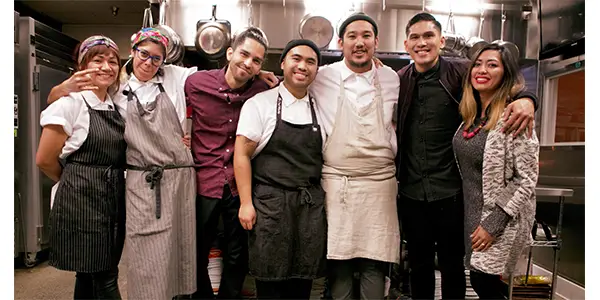Ulam (Main Dish) shines a light on a number of Filipino restaurants and their chefs that have blown up in America, driven by a passion to represent and share their heritage. Bringing Filipino cuisine to American tables is not just about introducing a new taste to people’s palettes, but to share what being Filipino means to them through their food.
Filipino Renaissance
In her first documentary, Alexandra Cuerdo interviews Amy Besa and Romy Dorotan of Purple Yam; Alvin Cailan of Eggslut, Unit 120, Paper Planes, and Amboy; Johneric Concordia and Christine Araquel-Concordia of The Parks Finest; Andre Guerrero of The Oinkster, Maximiliano, and The Little Bear; Charles Olalia of Rice Bar; Nicole Ponseca and Miguel Trinidad of Maharlika and Jeepney; Chad and Chase Valencia of LASA.

Together they demonstrate the vast tastes and styles that exist in Filipino cuisine and the values that hold them together. While the culinary industry is amongst the most challenging industries to make it, these chefs had to overcome the judgments that people have towards Filipinos.
There are few widely known Filipinos, but those who are, such as Ferdinand Marcos and Manny Pacquiao, have unfortunately given the Filipino community as a whole a bad rap. One that has grown so strong that it’s pushed these chefs to create restaurants and dishes that can redefine their image. By giving their personal oral history, their style, technique, and inspiration comes to life as their restaurants and each of their nuances are displayed on-screen. However, the common thread through all their stories is their desire to support one another and find success together.
Defining Authenticity
We long for home-cooked meals because of who they are made by. Mothers and fathers that would work all day and take what they had left in them to make you something to eat. It’s an act of pure love. Every dish that is served by these chefs is that. When you taste their food, you taste the food of someone that worked to be where they are and still everyday make food for their customers, their new family.
Though collectively their goal is to make Filipino cuisine as prominent as Italian food, they know that Filipino food will only go as far as their community supports it. “Any culture can love our food, but if our own culture doesn’t love it, we’re wasting our time,” Cailan states. It poses the challenge of balancing the familiar taste of these dishes people grew up with and still making dishes that are innovative. Cailan stresses that the food isn’t a matter if it is objectively good, but the perception that is created and made with.
Concordia explains the process of taking memories and using them to create the right taste. Digging deep to the moment that a bite of adobo takes them to and figuring out how to translate that into their dish. What makes a dish authentic varies, but each of them brings their experience and memories to the kitchen to make food that evokes what they feel it should be. The flavor of authenticity isn’t tangible, it’s just something that is there or isn’t and only these chefs can infuse it into their dishes. Above all, it comes from a place that appreciates and understands the value of where these dishes came from.
Hungry for More
It’s impossible to capture the smell and the taste of the dishes that are shown on screen, but Cuerdo doesn’t focus primarily on the food itself, but the words and spirits of the chefs. It is impossible not to fall in love with each of the chefs as they share why they do what they do. In the case of Filipino cuisine, the heart of the chefs is vital to why they succeed. They don’t want people to just taste food outside their comfort zones, but to know that every dish means something for the Philippines and everyone in the community. Filipinos continually struggle to be recognized for who they truly are, but food has finally given them the opportunity to express that.
Cuedro takes the journeys of these restauranteurs to show where Filipino food came from, where it is, and the possibilities for this movement to grow. While these chefs had to fight to be where they are against adversities, they gladly welcome us into their homes. Ulam is not only a triumph for Cuerdo but one for the entire Filipino community. It leaves your mouth watering for the vibrant flavors but most of all a longing to experience the lively spirit that exists within their community.
Find a screening for Ulam here.
Does content like this matter to you?
Become a Member and support film journalism. Unlock access to all of Film Inquiry`s great articles. Join a community of like-minded readers who are passionate about cinema - get access to our private members Network, give back to independent filmmakers, and more.